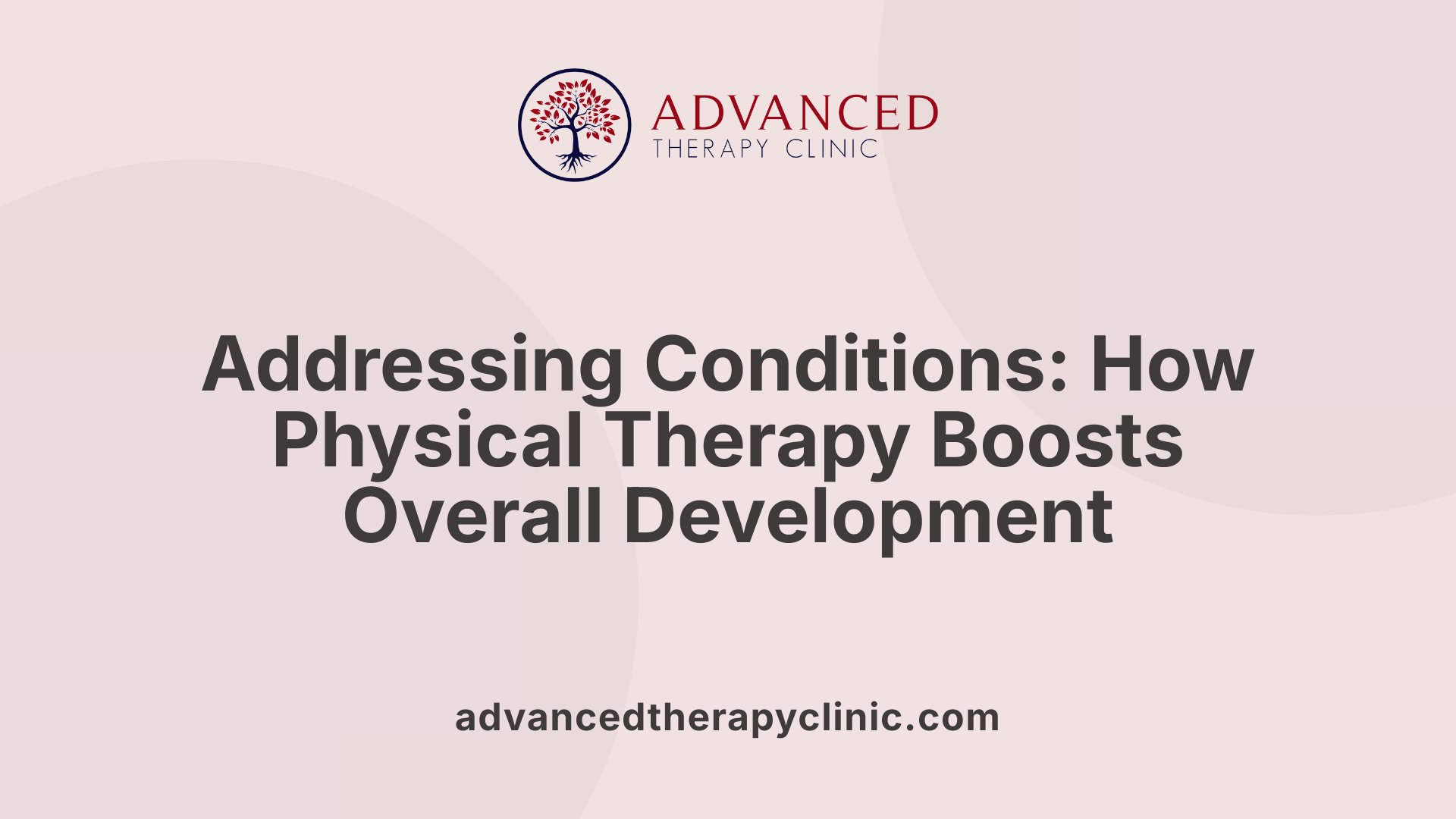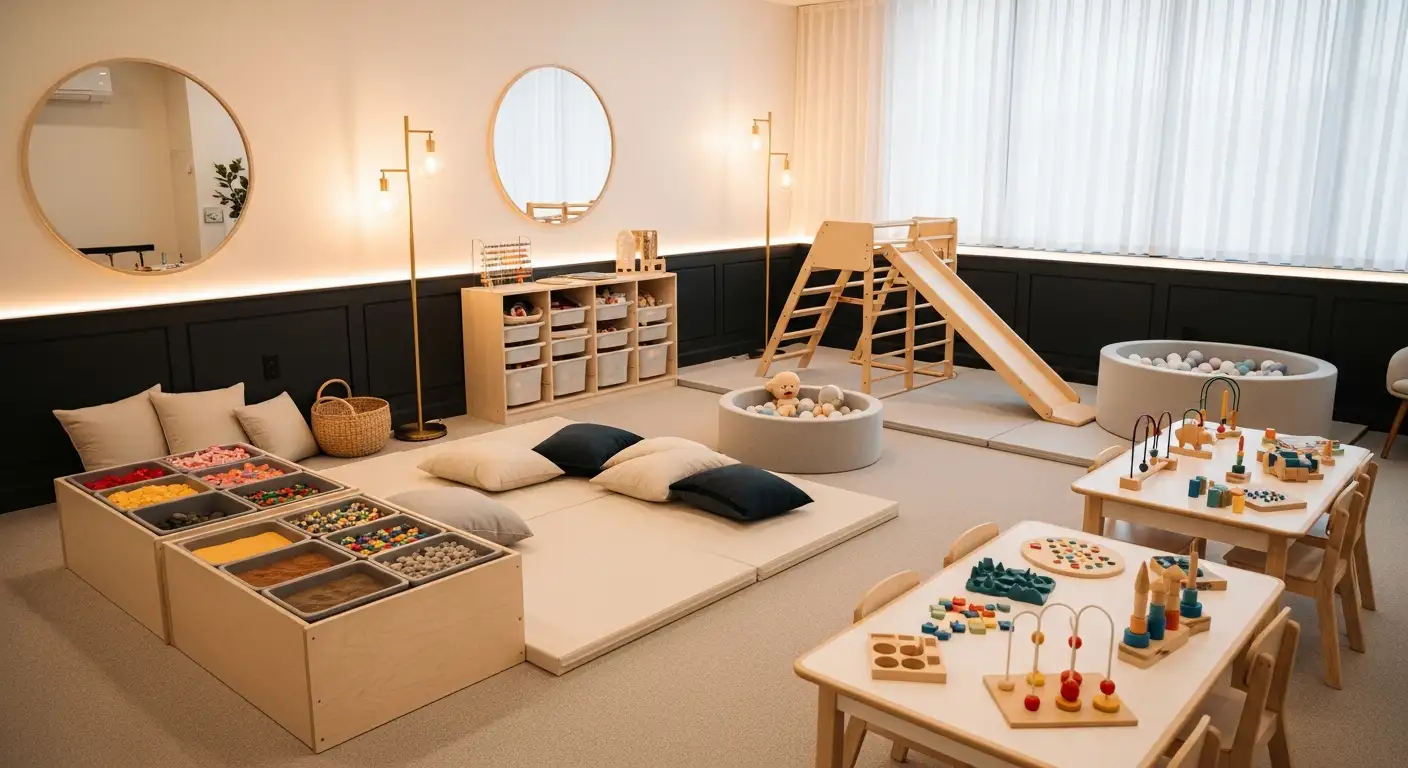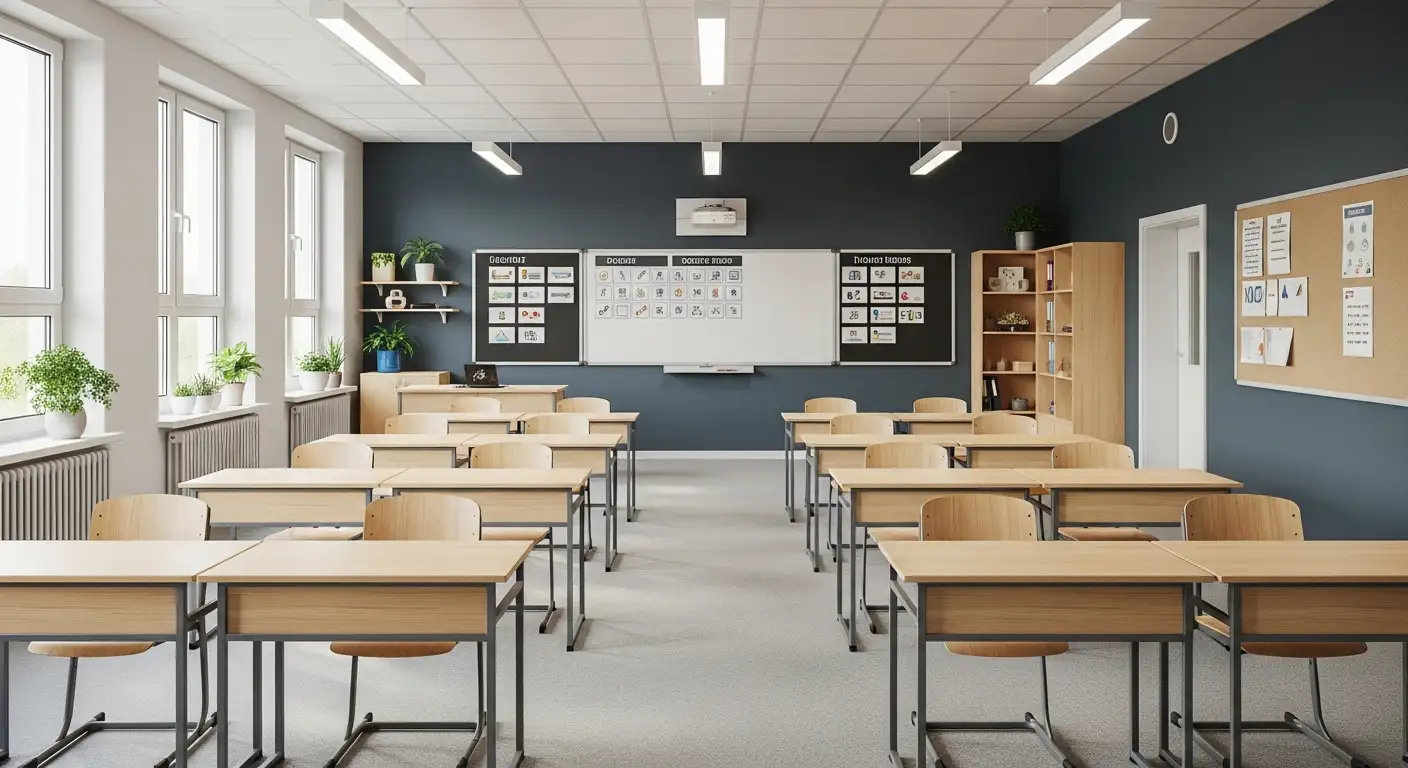How Physical Therapy Supports Children with Developmental Delays


Introduction to Pediatric Physical Therapy
Physical therapy plays a crucial role in supporting children with developmental delays by addressing their unique physical and motor challenges. As movement experts, physical therapists assess and treat various conditions that hinder motor development, helping children reach their full potential in mobility, coordination, and strength. Early assessment and intervention are key, allowing therapists to develop personalized strategies that foster growth, independence, and participation in daily activities from a young age.
The Role of Early Assessment and Intervention

What is the role of physiotherapy in supporting children with developmental delays?
Physiotherapy is a cornerstone in helping children overcome developmental delays. It focuses on improving key motor skills such as muscle strength, flexibility, coordination, balance, and proper posture. These foundational skills are essential for milestones like sitting, crawling, standing, and walking.
Starting therapy early is especially important. During early childhood, the brain is highly adaptable, and interventions can significantly influence a child's growth trajectory. Early physiotherapy helps to stimulate neural pathways, support sensory and motor development, and prevent secondary complications like joint contractures or muscle weakness.
Physical therapists create tailored treatment plans for each child. These may include exercises, motor skill training, use of assistive devices, and training families on how to support their child's development at home. This comprehensive approach encourages independence and participation in everyday activities.
Moreover, physiotherapy is effective in managing specific conditions such as cerebral palsy, Down syndrome, and autism spectrum disorder. Therapists employ targeted strategies, including play-based activities and adaptive equipment, to enhance the child's physical abilities.
Ultimately, early physiotherapy helps children reach their full potential. It enables them to improve their mobility, actively participate in social and educational settings, and build confidence. This early support not only addresses immediate developmental challenges but also sets a foundation for long-term health, well-being, and social inclusion.
For more information on early assessment and pediatric physical therapy, search terms like "early assessment developmental delays pediatric physical therapy" can provide helpful resources to parents and caregivers.
Personalized Treatment Plans to Support Development

How do physical therapists evaluate individual strengths and challenges?
Physical therapists start with a comprehensive assessment of each child's motor skills, muscle tone, balance, coordination, and overall physical development. They observe how the child moves and interacts during play, identify delays or difficulties, and use standardized tests to measure progress. This evaluation helps pinpoint specific areas needing support, such as muscle weakness, poor coordination, or sensory processing issues.
How are exercises and activities designed to match each child's needs?
Based on the assessment, therapists develop personalized treatment plans that include exercises and activities tailored to the child's age, developmental stage, and unique challenges. For example, a child who struggles with balance might engage in balancing exercises and coordination drills, like animal walks or obstacle courses. Play-based activities, such as balloon volleyball or therapeutic ball exercises, make therapy enjoyable and effective.
How is family involvement integrated into therapy?
Families are actively involved in the therapy process. Therapists teach caregivers specific exercises and strategies to support their child's development at home, ensuring consistency and reinforcement. They guide parents on positioning, handling techniques, and routines that foster motor skills outside the therapy sessions. Regular communication and updates ensure that progress is tracked and plans are adjusted as needed.
What should parents consider when seeking physical therapy for developmental delays?
When seeking therapy, parents should ensure they work with qualified pediatric physical therapists who conduct thorough evaluations. Recognizing early signs of delays—such as not reaching motor milestones or poor coordination—is crucial. It is important to act promptly, as early intervention can significantly improve outcomes.
Parents should verify the services provided, understand if insurance covers the therapy, and be willing to participate actively. Practicing recommended activities at home and creating a supportive environment can maximize progress. Many early intervention programs offer free or reduced-cost services for eligible children from birth to age 3, making these resources accessible. Maintaining ongoing communication with healthcare providers and showing patience are vital in supporting the child's development.
Development of Motor and Cognitive Skills

How does physical therapy help children achieve developmental milestones?
Physical therapy plays a vital role in helping children reach their developmental milestones, especially in motor skills development. Therapists focus on improving basic skills like crawling, standing, and walking, as well as more complex movements such as jumping or climbing stairs. They tailor exercises and activities to each child's unique needs, encouraging natural movement patterns that promote neural and muscular growth.
A typical approach includes assessment to identify specific delays or challenges. Based on this, therapists design personalized plans that incorporate play-based activities and exercises that foster strength, coordination, and balance. For example, therapy sessions might include tummy time, motor planning games, or balance drills, all aimed at stimulating brain development and muscle control.
Early intervention is especially impactful. When physical therapy begins sooner rather than later, it can significantly enhance mobility, coordination, and confidence. As children improve their motor skills, they become more capable of exploring their environment and engaging in play, which further supports cognitive and social development.
Moreover, physical therapy doesn’t only address movement. It also contributes to children’s self-esteem and independence. Achieving milestones like standing or walking with confidence helps them participate more fully in everyday activities and social interactions, setting a strong foundation for lifelong growth and resilience.
Ultimately, through targeted exercises and supportive engagement, physical therapy helps children develop essential motor and cognitive skills, paving the way for successful participation and learning in their daily lives.
Addressing Conditions and Supporting Broader Developmental Growth

What conditions can physical therapy address in children with developmental delays?
Physical therapy plays a vital role in helping children with a variety of conditions that affect their developmental progress. Pediatric physical therapists assess each child's unique needs through comprehensive evaluations and craft personalized plans. These plans often include exercises, positioning strategies, and the use of assistive devices to improve movement, strength, and coordination.
Common conditions that benefit from physical therapy include cerebral palsy, which impacts muscle tone and movement; Down syndrome, which can involve hypotonia and delayed motor skills; spina bifida, affecting spinal cord development; muscular dystrophy, leading to muscle weakness; as well as other neuromuscular disorders and orthopedic issues like scoliosis and torticollis.
Therapists focus on helping children reach important milestones, such as sitting, standing, and walking, while also addressing problems with balance and coordination. Early intervention is crucial to prevent delays from worsening and to promote optimal development. In addition to congenital and developmental conditions, physical therapy also aids children recovering from injuries or managing chronic musculoskeletal challenges, thereby enhancing their mobility and quality of life.
How does physical therapy influence emotional and social development?
Beyond physical benefits, physical therapy significantly supports the emotional and social growth of children with developmental delays. As children build strength and confidence through targeted exercises and activities, their self-esteem tends to improve. This increased confidence encourages them to participate more actively in social interactions, both in therapy settings and broader community or school environments.
Therapists often incorporate social elements into sessions, such as group play and cooperative tasks, which foster communication skills and peer relationships. These interactions help children learn essential social skills like sharing, taking turns, and negotiating, which are critical for emotional resilience.
Strengthening motor skills also enables children to independently explore their environment, reducing frustration and fear associated with physical limitations. Over time, this independence promotes emotional well-being, resilience, and a sense of accomplishment. Overall, physical therapy nurtures a child's ability to participate socially and emotionally, laying foundations for happier, more engaged childhoods and smoother transitions into school and community life.
Building a Supportive Environment and Family Involvement

What is the importance of physical therapy in supporting children with developmental delays?
Physical therapy plays a vital role in helping children overcome motor skill challenges and reach developmental milestones such as sitting, walking, and coordination. It is especially effective when started early, as it leverages the brain’s natural ability to adapt and rewire—known as neuroplasticity. Through targeted exercises and activities, physical therapists improve strength, balance, and mobility, laying a foundation for more complex skills like jumping or climbing stairs.
A core component of successful therapy is family involvement. Therapists educate parents and caregivers on how to assist with exercises, proper positioning, and daily routines that support growth and development at home. This collaborative effort not only reinforces learned skills but also fosters a positive environment conducive to development.
Creating a nurturing atmosphere encourages children to participate actively, build confidence, and develop independence. The supportive environment helps children feel safe and motivated to explore new movements and skills, which is crucial for long-term progress.
Overall, integrating family support with professional therapy enhances outcomes, promotes emotional well-being, and ensures sustainable development. When families are engaged, children benefit from consistent practice, encouragement, and affirmation, helping them become more active and confident in their abilities.
Fostering Growth and Independence Through Targeted Support
In conclusion, pediatric physical therapy is essential for supporting children with developmental delays by promoting motor skill development, strength, coordination, and independence. Early assessment and intervention leverage neuroplasticity, offering the best chance for children to reach their developmental milestones. Therapists develop individualized plans that encompass exercises, play-based activities, and family education, ensuring a holistic approach to development. Active family involvement, ongoing evaluation, and a multidisciplinary support system further enhance outcomes, empowering children to participate fully in life’s activities and achieve their full potential. As a vital component of early childhood care, physical therapy not only improves physical abilities but also fosters social, emotional, and cognitive development, laying the groundwork for lifelong success.
References
- Physical Therapy Guide to Developmental Delay | Choose PT
- Effects of early physical therapy on motor development in children ...
- Benefits of Early Intervention Physical Therapy for Children
- Physical Therapy for Children with Developmental Delays
- Physical Therapy for Developmental Delays
- The Importance Of Early Intervention In Physical Therapy For Children
- Pediatric Physical Therapy: Developmental Milestones
- Therapy for Infants & Toddlers with Developmental Delays
- Understanding Developmental Delays: How Pediatric Physical ...
- Physical Therapy - Pediatric Development
Recent articles

Occupational Therapy in Autism
Enhancing Independence and Quality of Life Through Occupational Therapy in Autism

Do Autistic People Understand Sarcasm?
Navigating the Nuances: Understanding Sarcasm and Social Communication in Autism

Autism Routines
Crafting Effective Daily Structures for Children with Autism

The Benefits of ABA Therapy for Sibling Relationships and Family Bonds
Strengthening Family Ties Through Applied Behavior Analysis

How Speech Therapy Assists with Improving Verbal and Nonverbal Communication
Unlocking Communication Potential: The Role of Speech Therapy

Supporting Autism During Transitions
Strategies and Therapies to Navigate Transitions for Children with Autism

